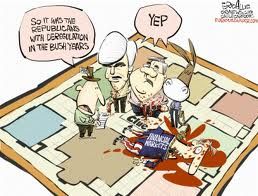(10 am. – promoted by ek hornbeck)
 Writing for naked capitalism Matt Stoller sheds some light on the myth of retiring Massachusetts Rep. Barney Franks’s true politics, and it’s not as liberal as you would think. Despite the press touting Mr. Frank as a “top” and “passionate” liberal in reality, Mr. Stoller points out, that in reality he has been a career Reaganite
Writing for naked capitalism Matt Stoller sheds some light on the myth of retiring Massachusetts Rep. Barney Franks’s true politics, and it’s not as liberal as you would think. Despite the press touting Mr. Frank as a “top” and “passionate” liberal in reality, Mr. Stoller points out, that in reality he has been a career Reaganite
The career of Barney Frank casts a large shadow upon the Democratic approach to financial matters, as he perfectly epitomizes how they behaved throughout this time period. Frank was elected in 1981, as a quintessential Reagan-era Democrat. He is frequently misunderstood, and cast as a liberal. In another era, he would have been such. But he was first and foremost interested in cutting deals, and to that end, his ideology ended up as that of a Reagan-lite. It’s unfortunate, because by the time he had real power in 2008, he had no firm basis upon which to make decisions for the broad public, and ended up consolidating wealth into the hands of a smaller and smaller number of people. [..]
He’s a bank-friendly Democrat who is believes in neoliberal ideas, but wants to ensure that there is some housing for the poor. Let’s take this comment, which cuts to the core of how Frank sees the economy.
“These days in developed countries, everybody says you need a private sector to create wealth, you need a public sector to create rules by which wealth is created. Sensible people understand that.”
This is absurd. The government creates enormous amounts of wealth, from the telecommunications industry to the computer to the internet, to infrastructure like the national highway system. If you’re driving across any number of bridges or traveling over airports, that’s wealth. That’s value. And it’s government-created. The Reconstruction Finance Corporation lent out a total of $55 billion in the 1930s and 1940s, it was a government-bank that financed infrastructure all over the country. Liberals govern like wealth can be created in both the public and private sector, and destroyed in both areas as well. Neoliberals like Frank put their faith in the private sector.
Nor is Barney a friend to activists as Matt sites this statement that was made just recently about the Gay Pride movement:
And I believe very strongly people on the left are too prone to do things that are emotionally satisfying and not politically useful. I have a rule, and it’s true of Occupy, it’s true of the gay-rights movement: If you care deeply about a cause, and you are engaged in an activity on behalf of that cause that is great fun and makes you feel good and warm and enthusiastic, you’re probably not helping, because you’re out there with your friends and political work is much tougher and harder. I’m going to write about the history of the LGBT movement, partly to make the point that, in America at least, it’s the way you do progressive causes….
Pride Weekend was very important early on, because people didn’t know who we were, the hiddenness was a problem. Today, Pride has no political role. It’s a fun thing for people.
Wow! If it weren’t for the activists of OWS and Gay Pride there would be no change in public attitude about LGBT rights and no turn in conversation about the corruption of Wall St. and the causes for the income disparity that is holding back the economic recovery from the Great Recession.
Like President Obama, Barney Frank likes bipartisanship and compromise. The problem with that is it has been the downfall of the Democratic Party and widening of income disparity for the 99%. It well past time Barney Frank retired. Let the voters of Massachusetts replace him with a representative that will stand for the principles of the Democratic Party, the majority of Americans and not the banks and Wall St.
Happy retirement, Mr. Frank, and congratulations on your up coming nuptials which might not be happening if it weren’t for the Gay Pride movement.

1 comments
Author